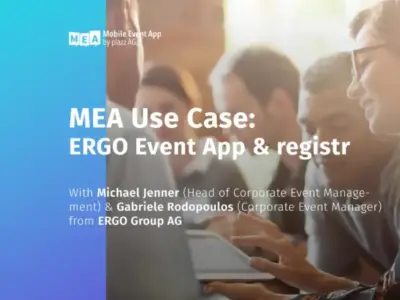
Successful events are more important today than ever before. They help companies to increase their brand awareness, establish valuable networks and generate leads. The objectives of such events are diverse and demanding. Event management tools play a decisive role here by supporting organizers in all phases of the event process.
From precise goal setting and efficient attendee management to the promotion of networking opportunities, these tools offer comprehensive solutions. They also enable seamless execution and real-time management during the event, as well as thorough follow-up and analysis to optimize future events.
In this article, you will learn how event management tools can help you achieve your event goals efficiently and successfully. Discover the many possibilities and best practices available to you.
Table of contents
- Successfully pursuing and achieving goals
- Manage participants optimally and create individual experiences
- Creating connections and maintaining communities
- Optimally controlled events for maximum impact
- Recognize and exploit optimization potential
- Efficient event management with our integrated solution
- Conclusion
Successfully pursuing and achieving goals
The first step to a successful event is to clearly define your objectives. These should be specific, measurable, achievable, relevant and time-bound (SMART). Common goals include increasing brand awareness, making valuable contacts and generating new leads.
How event management tools help with target tracking and evaluation
Event management tools are crucial to monitor the progress of your goals and evaluate the success of your event. These tools offer features such as:
-
- Goal tracking: Keep a constant eye on your SMART goals and continuously monitor their progress.
- KPI monitoring: Monitor key performance indicators (KPIs) in real time to ensure your event stays on track.
- Analytical insights: Use data analysis to evaluate the success of your measures and make adjustments.
Manage participants optimally and create individual experiences
Imagine how much easier your event planning will be if you use efficient attendee management. With event management tools, you can handle the entire process effortlessly – from registration to ticket sales and attendee tracking. These tools offer user-friendly registration forms, allow you to manage different ticket options and provide real-time tracking so you always have an overview.
But that’s not all. A personalized attendee experience significantly increases the satisfaction and engagement of your guests. By leveraging data, you can create personalized invitations and tailored communications. Event management tools allow you to provide customized agendas and content. Your attendees can create their own schedules and choose from a variety of workshops, presentations and networking sessions.
Advantages of personalized participant management
-
- Greater satisfaction: Your participants feel valued and individually addressed. Every message and invitation addresses their personal interests and needs.
- Increased engagement: Personalized content and agendas keep your guests interested and active. When participants can customize their agenda, this increases their motivation and participation.
- Better data quality: Through the targeted collection and analysis of attendee data, you gain valuable insights for future events. This data helps you to design future events even better and tailor them to the needs of your guests.
Creating connections and maintaining communities
Networking is often a key objective of events. With the right tools, you can create targeted opportunities for your attendees to network effectively. Event management tools offer numerous functions that help to identify relevant contacts and foster connections. These include:
-
- Participant profiles: Allow participants to create detailed profiles that reflect their interests and goals.
- Matchmaking algorithms: Use algorithms to bring together participants with similar interests and goals.
- Networking sessions: Organize special networking events where participants can exchange ideas in an informal atmosphere.
Discover 10 creative networking ideas for successful events in our blog post!
Building and maintaining communities
Building a community goes beyond the event itself. Event management tools support you in maintaining long-term relationships and retaining your participants. Through continuous interaction and targeted communication, you can build a strong community that remains active beyond the event. Event management tools offer the following functions to ensure long-term loyalty:
-
- Discussion forums: Provide platforms for continuous exchange between participants.
- Regular updates: Keep the community up to date with regular newsletters or push notifications.
- Exclusive content: Make exclusive content and resources available to the community.
Optimally controlled events for maximum impact
The realization of your event is the moment when all the planning is put into action. This is where precise real-time coordination and flexibility are required. Event management tools offer you numerous functions to keep an eye on every aspect of your event and manage it optimally.
Real-time communication and coordination
Effective communication is the key to a smooth process. Event management tools allow you to keep everyone involved informed and coordinated in real time. With mobile apps and notification functions, you can send quick updates and instructions directly to your team and participants. This way, everyone is always up to date and can react immediately to changes.
Real-time analyses and reports
Another important aspect of real-time management is the ability to instantly access up-to-date data and analytics. Event management tools provide you with real-time insights into attendee numbers, interactions and other key metrics. This information helps you to make informed decisions and continuously monitor the success of your event.
Live feedback and surveys
Collecting feedback during the event is crucial to measure attendee satisfaction and make immediate adjustments. With event management tools, you can conduct surveys in real time and analyze the results immediately. This allows you to respond to the needs and wishes of your guests and continuously improve their experience.
Advantages of real-time management
-
- Rapid response: You can react immediately to unforeseen events or changes and make adjustments to ensure that your event runs smoothly.
- Improved efficiency: Efficient management of resources and real-time communication ensures that all aspects of your event are optimally coordinated.
- Increased participant satisfaction: Thanks to the ability to receive and respond to immediate feedback, you can better meet the needs of your participants and increase their satisfaction.
Recognize and exploit optimization potential
The follow-up of an event is just as important as the planning and implementation. Event management tools offer you valuable functions for recording and analyzing event data in order to evaluate the success of your event and improve future events.
Collection and evaluation of event data
After the event, you should collect and evaluate comprehensive data. This includes participant analyses, survey results and the calculation of the return on investment (ROI). This information will give you an insight into the effectiveness of your event and help you to identify areas for improvement.
Reporting and insights
The use of dashboards and reporting tools enables detailed reporting. You can create reports that clearly present the most important findings and data. These reports help you to evaluate the performance of your event and make informed decisions for future events.
Follow-up measures and long-term strategies
After the event, it is important to take follow-up measures to maintain the relationship with your participants. Send thank you messages, share important content and stay in touch. These measures will strengthen the bond with your participants and encourage participation in future events.
Advantages of follow-up and analysis
-
- Improved event planning: By evaluating the data, you can identify weak points and optimize future events.
- Increased participant loyalty: Follow-up measures show your participants that you value their feedback and are interested in a long-term relationship.
- Well-founded decisions: Dashboards and reporting tools provide you with all the information you need to make informed decisions for your future events.
Efficient event management with our integrated solution
Our event management tool consists of three main products: registr, the Check-In App and the Mobile Event App (MEA). These tools work seamlessly together to solve typical event planning problems and make your event efficient and user-friendly.
Registr
The first challenge in planning a successful event is registering participants. With registr, this process is greatly simplified. You can send personalized invitations and confirmation emails, participants can easily register and even add accompanying persons. This saves you time and avoids misunderstandings.
Check-In App
Running the event requires precise real-time coordination. Our check-in app enables seamless accreditation of your participants on site. Long queues and chaotic processes are a thing of the past. With real-time statistics, you can react flexibly and ensure that everything runs smoothly.
Mobile Event App (MEA)
One of the biggest challenges at events is the interaction and networking of participants. The MEA encourages networking and community building through features such as personalized agendas, matchmaking, maps and interactive livestreams. This allows your attendees to create their own schedules and choose from a variety of workshops, presentations and networking sessions.
Advantages of integration
By seamlessly integrating these tools, you can ensure that every stage of your event – from registration to feedback – is optimally covered. Registr helps you to simplify and customize the registration process. The check-in app ensures smooth on-site execution, while the MEA encourages interaction and networking among your attendees and enables real-time feedback. This way, you can ensure that your event is a complete success and your participants are satisfied.
Conclusion
Today, event management tools are indispensable for the successful planning and implementation of events. They offer comprehensive support in all phases of the event process, from precise goal setting, efficient participant management and community building to real-time coordination and detailed follow-up.
Precise goal setting and strategic planning with event management tools enable you to set and continuously monitor specific, measurable goals. Efficient attendee management and personalization of the attendee experience ensure higher satisfaction and engagement. Networking and community building are encouraged through special features that facilitate long-term relationships. During execution, real-time communication and feedback mechanisms provide optimal control and flexibility. Finally, post-processing and analysis enables detailed evaluation and optimization of future events.
With registr you can make the registration process flexible and user-friendly. The check-in app ensures quick and smooth check-in and check-out. The Mobile Event App (MEA) offers comprehensive communication and interaction options, promotes networking and enables real-time feedback.
These tools solve common problems such as complicated registration processes, long waiting times and lack of interaction. Seamless integration allows you to manage your events efficiently and maximize attendee satisfaction.
By using these technologies, you can achieve your event goals, build valuable relationships and ensure long-term success. Every event becomes a step forward on your road to success.



